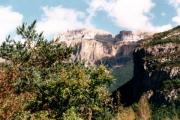Which side of the Pyrenees is best? The French and Spanish sides show very different aspects and I love what I’ve seen of both. I hope I’ll be doing something soon on Vernet-les-Bains in France. However I’ve more pics on the southern side so here's Torla.
|
 |
 |
 |
 |
 |
 |
 |
 |
Ordesa y Monte Perdido Parque Nacional
 |
 |
If you are going by car, you have a choice of crossings from France. I was, as usual, on public transport, having flown to Barcelona. I started by taking the train to Leira and then a bus to Huesca, a provincial capital in Aragón. I stayed there to get the train journey in daylight next day. It has no massive appeal to visitors but I liked it. I arrived at the station for the first train to Canfranc on the French border, without passing anywhere for breakfast. I expected a bit more from the ride. At Canfranc I took a French bus to Oleron Sainte-Marie. This gives a beautiful ride through the densely wooded French slopes and valleys – but then takes you beyond the mountains – could have been justified if the lovely church hadn’t been swamped by netting! The real point is that I was easily able to return through Canfranc to Jaca in time to see the Cathedral and Citadel before getting the evening bus to [H]echo [only one a day – return early morning]. The next evening I continued on the bus to Ansó in the next valley. I shall call the first village Echo, it’s newer name. The return bus enables you to take another one from Jaca to Sabiñanigo in time for the morning bus to Torla. This is ideal for the Ordesa National Park. After several nights here I continued with the bus to Ainsa, with its terrific old town and square. I then hitched a lift with a group of school teachers from Barcelona as far as Castejón de Sos, in the Ésera valley below Benasque. I spent the night there. The next day I felt I wanted to see Benasque before leaving for Catalunya. Sadly I hated it – not just the weather but the place – no doubt the access for some wonderful walks but like a twelfth class Alpine resort. At the first chance I returned down the valley to Graus, from where I caught a bus [lovely route but I was the whole of ‘the passengers’ so it may not still run – outside summer anyway] to Pont de Suert in Catalunya.
|
|
| Favourite spots: |
 |
 |
![Torla [good weather next 2 days!] Torla [good weather next 2 days!]](/data/reportpix/thumb/torla-report-1523-5.jpg) |
 |
 |
 |
 |
 |
Torla [good weather next 2 days!]
 |
 |
Torla has an enormous car park where the minibus, complete with luggage trailer, stops. It needs to be big because for most of the year there’s no car admission to Ordesa and everyone goes by coach from here – coaches every twenty minutes. From the village centre above you don’t notice the modern expansion too much and I loved my stay there. There is an excellent information centre of the route up to the park and you can get on a later bus with the same ticket. From the top car park [toilets, refectory, info point etc] there are walks and climbs of all standards. On successive days I was able to follow the main valley upwards for several miles and return on the opposite side and to take the pedestrian route back to Torla, a delightful route with periodic detours to waterfalls. Another way for those unable to undertake major walks might be to get a seat in a Land Rover taxi but I was unlucky with this – it’s too expensive unless you can join an incomplete party.
|
|
| What's really great: |
|
Echo and Ansó are in roughly parallel valleys which lead up in the direction of the French border. There is no bus above Ansó and from Echo only two or three km to Siresa. The great walking is much further on but I found it easier to hitch from Ansó than anywhere else I have tried in Spain. Both villages are delightful for their own sakes and the bus route between them, over a pass, is wonderful. I was greeted at the top by the first sun for hours, breaking through with the most stunning colours and shadows and a remarkably clear double rainbow after thunder, lightning and RAIN, to the driver’s yells of ‘Mira, mira, Señor.’ I hardly needed telling to look! Echo seems much older than it is and I’m surprised I heard no claim for it to be Spain’s prettiest – it ranks well up with those that do. There are steps all over – and well-stocked though small shops. Siresa, up the valley, is noted for its ancient monastery [key in house above the bar].
|
|
| Sights: |
From Torla the Sabiñanigo minibus continues to Ainsa. This is a route south of the main mountain mass of the National Park, entrancing rather than spectacular. If you are dropped off at the crossroads in the centre, the town appears to have no significant interest and you might even wonder whether it’s worth following the path uphill to the old quarter. Press on regardless!
At the top you come to a really large square, which would be an esteemed Plaza Mayor in a large city. To my surprise my minibus was there among the traffic! At hte far end of the square a narrow road leads out on each side like a continuation and the one on the left passes the splendid old church. Both fall steeply to the same level as the centre.
|
|
| Accommodations: |
Here are 3 and they were all first rate.
· Echo: Casa Blasquico, practically with its own bus stop! Extremely friendly [the woman owner and her help took me by car to Siresa, because I needed to use a stick and I was given a sitting room with delicious cake and coffee free during the outrageous thunderstorm.] My introduction was a profuse apology for no single rooms and a telephone search for somewhere cheaper. I was glad it failed and it wasn’t expensive anyway. Limited English but plenty of help around if needed.
· Ansó: The Hostal Kimboa. It remains almost entirely Spanish speaking, although being the place used by a British provider of walking holidays. Again very friendly and helpful.
· Torla: Hotel Ballarin. The owners also have an hostal straight opposite. The only snag is a short but immensely steep path/road outside, which makes it unsuitable for the very disadvantaged. In all other respects it’s excellent. Reception is very helpful.
|
|
| Restaurants: |
All three of the above accommodations provide food and they are all as good in this way as in any other. I hesitate to distinguish between them in terms of quality but the restaurant in the hotel at Torla serves more people from outside and is esteemed at the nearby campsite. Perhaps it’s also a bit bolder with giving a choice of local dishes – try the rabbit with celery if they still do it. There are more conventional choices if this makes you heave.
I’m afraid I was witness to some disgusting rudeness here. Two women berated the woman who was the only English speaker on the staff because she took time coming to them and cursed her for not being able to explain all the ingredients. ‘This is f Europe, isn’t it? If we speak f English, why don’t you?’ I was able to speak enough Spanish to explain loudly that they weren’t English and didn’t come from an English speaking country.
|
|
| Other recommendations: |
Although I couldn’t come to terms with Benasque and never intend to go there again, the valley down from it, the Ésero, is another thing entirely with some great gorge scenery. Castejón de Sos is a pleasant enough pale to stay and to eat but the main charms of the valley are seen from the bus between villages.
The route from Graus to Pont de Suert is quite different. It’s very much a foothill route and you pass fairly recently abandoned villages [unless they are now under reservoirs!]
Most regrettably the bus doesn’t go the short distance uphill to Roda de Isabena, which is supposed to have an outstanding cathedral [why, in the back of beyond?]
But not long before arriving at Pont de Suert, it passes through the best gorge of any I saw with a road.
|
|
Published on Thursday January 27th, 2005
|
|
 Publish on Facebook
Publish on Facebook
|
Tue, Feb 01 2005 - 07:40 PM
 by mtlorensen
| Horray for you for standing up to those women. I guess you find obnoxious people anywhere you go. Thanks for the nicely detailed report! |
Sat, Jan 29 2005 - 02:28 AM
 by ravinderkumarsi by ravinderkumarsi
hii david,
yet another excellent report.
|
| Information: |
| Login if you are a member, or sign up for a free membership to rate this report and to earn globo points! |
|

|
